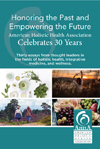American Holistic Health Association
The free, impartial wellness resource connecting you to the power of choice

Special Updates
Archives 2022
The monthly Special Updates from the AHHA are Reports with items of interest to those actively enhancing their health and well-being. Each Report features a health or health freedom issue. It also features a research item and an AHHA resource.
These free Reports are sent out to subscribers. You can have these AHHA Special Updates sent to you personally by signing up online.
The Archives of these AHHA Special Updates Reports are maintained here for those who have not yet signed up to receive them by email and those who wish to review past issues.
December 23, 2022
FEATURED RESEARCH
Reduce Carbs, Relieve Reflux
“Important lifestyle factors that can trigger or increase heartburn and other reflux symptoms.”…“The overwhelming result was that all the women with reflux had resolution of GERD symptoms within ten weeks and discontinued their reflux medications.” From a Townsend Letter research article, “Let’s Be Real About Reflux: Getting to The Heart of Heartburn” by Steven Sandberg-Lewis, ND, DHANP.
FEATURED ISSUE
Is homeopathy doomed in the U.S.?
Are you one of the nearly seven million U.S. residents who use homeopathic remedies in your personal health care? If so, this is to alert you to upcoming anticipated changes in the accessibility of these products.
Homeopathic medicines were intended to be grandfathered into the Food, Drug, and Cosmetic Act of 1938, a federal law, but with an exemption from the usual new drug approval process. Instead homeopathic medicines are required to undergo pre-market approval with a monograph from the Homeopathic Pharmacopoeia of the United States, which involves some clinical verification of the efficacy of the substance. In 1988, the U.S. Food and Drug Administration (FDA) issued a Compliance Policy Guide titled “Conditions Under Which Homeopathic Drugs May be Marketed.” This was withdrawn in 2019 and replaced with a draft guidance titled “Drug Products Labeled as Homeopathic.” While this guidance, which was finalized 12/6/22, labels the text as “Contains Nonbinding Recommendations,” in practice, a guidance is in fact binding and must be followed, it is more difficult for the public to challenge it legally.
The new 2022 FDA guidance states:
- Any homeopathic drug that has not been considered “generally recognized as safe and effective” (GRAS/E) is considered a new drug;
- FDA has not determined that any homeopathic drugs are GRAS/E;
- A new drug cannot be marketed unless it goes through the FDA’s approval process;
- No homeopathic drugs have gone through FDA approval.
One omission of concern to the homeopathic industry is that the new guidance document does not provide manufactures with clear direction and standards for marketing homeopathic products, which were in the 1988 guide. Might this be contributing to the headlines that every homeopathic medicine on the market is now illegal? Are we to believe those that predict that it is just a matter of time until homeopathic products will not be available in the U.S., but we just don’t know how quickly this will happen? Might there still be time to slow down or stop this latest FDA action? What we do know for sure is that the FDA now holds the rights to take enforcement action against any homeopathic product it chooses.
Issue: What is the future of homeopathic medicines in the U.S.?
AHHA strives to maintain a neutral position on issues and views knowledge as power. For those interested in this month’s issue, we are providing you with articles to help you understand that there are two divergent views of an ancient healing option and its safety for the American public.
PRO Homeopathy
General Homeopathy FAQs
American Association of Homeopathic Pharmacists
CON Homeopathy
Homeopathy: What You Need To Know
National Institutes of Health – National Center for Complementary and Integrative Health
FDA’s latest position on regulating homeopathy
FDA News Release: FDA Roundup (12/6/22)
U.S. Food & Drug Administration
Homeopathic Products (12/7/22)
U.S. Food & Drug Administration
Homeopathic Drug Products Guidance for FDA Staff and Industry (December, 2022)
U.S. Food & Drug administration
Industry concerns about FDA’s position on regulating homeopathy
FDA Finalizes Homeopathic Guidance (12/12/22)
by Alissa Gould
American Association of Homeopathic Pharmacists
Explaining the FDA’s New Homeopathy Policy (12/15/22)
Alliance for Natural Health USA
Urgent Action: FDA Plans to Ban Homeopathic Medicines (12/2/22)
by Michelle Edwards
UndercoverDC
FEATURED AHHA RESOURCE
Unique video blurbs
You are invited to view brief ,educational, health-related video clips created by AHHA members in our Self-Help Videos section. These video clips, which give tips on health and wellness, are offered to support your journey toward achieving a higher level of wellness.
November 11, 2022
FEATURED RESEARCH
Cancer and vitamin B3 deficiency
Supplementation with vitamin B3 (niacin), the precursor to NAD, can lower the risk of cancer. NAD deficiencies are observed in nearly all cancer patients, likely due to the energy-draining component of suffering from hyper-proliferative cells.” From a Townsend Letter research article, “Niacin and Cancer – How Vitamin B3 Protects and Even Helps Repair Your DNA” by W. Todd Penberthy, PhD, Andrew W. Saul, and Robert G. Smith, PhD.
FEATURED ISSUE
PFAS in tampons
If you are cautious about the ingredients in products you put into contact with your physical body, you will most likely be concerned about products that do not include a toxic substance listed on the company’s product list of ingredients.
A recent product alert concerns a number of feminine hygiene products, specifically tampons, that tested positive for fluorine, an indicator of the group of chemicals known as PFAS (Per- and Polyfluorinated Substances). PFAS have the ability to impact almost every organ of the body and increase the risk of a number of diseases.
While there are some federal government regulations regarding PFAS, these regulations are not strong. For example, the U.S. Food & Drug Administration only suggests that companies do product testing for a number of potentially dangerous chemicals, including PFAS. It is helpful to consumers, however, when there are alerts of independent research identifying potentially dangerous product brands along with safe alternative product brands.
Issue: Identifying safe tampon brands
AHHA strives to maintain a neutral position on issues and views knowledge as power. For those interested in this month’s issue, we are providing you with articles indicating how federal government agencies are addressing PFAS and other articles alerting you to research results from independent consumer protection organizations.
Government cautions:
Per- and Polyfluoroalkyl Substances (PFAS) (updated 7/6/22)
U.S. Food & Drug Administration
Meaningful and Achievable Steps You Can Take to Reduce Your Risk (updated 8/18/22)
U.S. Environmental Protection Agency
Federal Procurement and PFAS: The Push (and Push Back) for Policy Change (8/17/22)
Arnold & Porter
Consumer alerts:
Evidence of PFAS found in tampons – including organic brands (10/27/22)
Environmental Health News
Study Warns of Potentially Cancer-Causing PFAS Chemicals in Tampon Brands Commonly Used by Women Throughout U.S. (10/27/22)
About Lawsuits
PFAS Found in Tampons (11/3/22)
Alliance for Natural Health USA
FEATURED AHHA RESOURCE
Options to gift health this holiday season
Are you looking for a special holiday gift that will motivate a loved one to pay more attention to their health and well-being? AHHA members have written books and created CDs and DVDs that are filled with tips for improving your health. You can learn more at Health-related Books, CDs, DVDs, Videos and at the AHHA Organizational Members’ Self-Help Tools database under the Books/ Other Media section.
October 21, 2022
FEATURED RESEARCH
Neglected heart health factors
“Whether an individual seeks peak exercise performance goals or generalized wellness, quantifying sufficient pulmonary function and competency is of paramount importance.” “Increasing levels of NAD (nicotinamide adenine dinucleotide) through supplementation with NR (nicotinamide riboside) is critical for cardiovascular health and cardiac energy metabolism.” From a Townsend Letter research article, “Novel Ways to Support Cardiac Energetics” by Chris D. Meletis, ND.
FEATURED ISSUE
FDA proposed changes to definition of “healthy”
The U.S. Food & Drug Administration (FDA) recently proposed updated criteria for when foods can be labeled “healthy” on their packaging. The proposed “healthy” label changes would primarily involve requiring at least a minimum amount of one of several food groups (vegetables, fruits, grains, dairy, protein, or certain oils) while also reducing allowed limits of saturated fat, sodium, and added sugars.
Industry comments in response to these proposed changes to food product labels are supportive of the key changes noted above, but add that this does not go far enough and that the public response will most likely not be significant. They anticipate that consumers’ reactions will depend on how motivated they are to make the effort to purchase healthier products, have time to read the labels to figure out which is the healthier product, and have the funds for higher priced healthier products. It may be that the most impact will be if food manufacturers end up offering healthier products.
At least you are now aware of the possibility of revised meanings for the “healthy” educational designation on your food product labels in the future.
Issue: Do you care about definitions for “healthy” food product labels?
AHHA strives to maintain a neutral position on issues and views knowledge as power. For those interested in this month’s issue, we are providing you with the extensive FDA information on their proposed food label changes and how they would be implemented. Also we are including a sampling of industry comments on the proposed changes specifically, plus other related matters. Note that we are currently in a Federal Register government comment collection period through 12/28/22 for those who want a say in the new definition.
U.S. Food & Drug Administration (FDA) has posted a series of articles related to their proposed updates to the revised definition for a “healthy” claim on food labels in the United States and how those changes would be implemented:
(1) FDA Proposes to Update Definition for “Healthy” Claim on Food Labels (9/28/22)
(2) A Fresh Take on What “Healthy” Means on Food Packages (9/28/22)
(3) FDA’s Nutrition Initiatives (9/28/22)
(4) Food Labeling: Nutrient Content Claims; Definition of Term “Healthy” (9/29/22)
A Proposed Rule by the U.S. Food & Drug Administration
(5) FDA Proposes Updated Definition of ‘Healthy’ Claim on Food Packages to Help Improve Diet, Reduce Chronic Disease (10/4/22)
(6) Use of the Term Healthy on Food Labeling (10/7/22)
Sampling of industry articles with reactions to proposed changes:
(1) How Do You Define Healthy Food? (10/5/22)
by Jane Caldwell, PhD
American Council on Science and Health
(2) FDA’s ‘Healthy’ Failure (10/4/22)
Alliance for Natural Health USA
(3) What Makes a Food ‘Healthy’? Here’s How the FDA Wants to Change the Definition (10/3/22)
by Julia Ries
health.com
(4) FDA wants new definition of ‘healthy’ food (9/30/22)
by Foster Meyerson
DC News Now
The Federal Register has posted an opportunity for comments to be posted through 12/28/22
Click here to access
FEATURED AHHA RESOURCE
Your spiritual self
The holistic, or whole person, approach sees “the whole as more than just the sum of its parts.” This means that the whole of you is an integrated union of your physical, mental, emotional, and spiritual selves. AHHA’s website offers a list of books that can support you in developing a richer connection with your spiritual self. Take a look at the books in the Connecting to Your Spirituality database to find the books that will speak to you.
September 16, 2022
FEATURED RESEARCH
Relationship between pain and lifestyle
“When it comes to pain there are many who realize that lifestyle plays a part, but the significance of food is generally underappreciated… There are many lifestyle issues that contribute to an increased perception of pain. These include oxidative stress and other things that decrease a body’s resilience.” From a Townsend Letter research article, “Lifestyle, Inflammation, and Food Pain” by Hal S. Blatman, MD.
FEATURED ISSUE
COVID vaccine side effects
Acknowledging the Centers for Disease Control and Prevention (CDC) as the official authority for government health information, it seems important to note that this month (September 2022) the CDC is publishing new information related to side effects from the COVID vaccines. As this new data unfolds, there do not appear to be any major news coverage. So it will be up to you to be on the lookout for these opportunities to learn about newly posted CDC-sourced data related to documented COVID vaccine side effects, including their frequency, severity, and even when this information was first known.
If you should feel that you or a loved one is dealing with one of these possible vaccine side effects, be sure to have a frank discussion with your physician and become part of the journey to find ways to counteract any on-going negative impact on your health.
Issue: Are COVID vaccine side effects being revealed?
AHHA strives to maintain a neutral position on issues and views knowledge as power. For those interested in this month’s issue, we provide you with some samples of actual words from the CDC to give you an opportunity to access and evaluate changing data.
CDC on COVID Myocarditis Side Effects:
Oops! FDA Accidentally Reveals List of Covid Vaccine Side Effects, Including Myocarditis, Autoimmune Disease & Death (7/30/21 )
[reported myocarditis rates 10/22/20]
Adan Salazar
Science Goes Too Slow For The News (9/6/22)[
[reported myocarditis rates Aug 2021 & Aug 2022]
Matt Shapiro
Letter chain related to CDC tracking of COVID-19 vaccine adverse events:
Letter from Ron Johnson, U.S. Senator, to Rochelle P. Walensky, MD, MPH, Director, CDC (6/23/22)
Letter from Ron Johnson, U.S. Senator, to Rochelle P. Walensky, MD, MPH, Director, CDC (7/25/22)
Letter from Rochelle P. Walensky, MD, MPH, Director, CDC, to Ron Johnson, U.S. Senator (9/2/22)
Letter from Ron Johnson, U.S. Senator, to Rochelle P. Walensky, MD, MPH, Director, CDC (9/12/22)
FEATURED AHHA RESOURCE
How to find a progressive physician
Are you searching for a medical doctor who delivers care that is more than just drugs and surgery? Check our Holistic Practitioners database. If this does not help you locate such a physician in your geographic area, the Practitioner Referral Sources list is a useful next step. This list includes a wide variety of healthcare modality associations that give referrals, some of which are exclusively for medical doctors. Physicians who are affiliated with the organizations in our databases are definitely the open-minded, progressive ones who have gone beyond drugs and surgery. Where else but with AHHA can you find so many of these special physicians so easily?
August 19, 2022
FEATURED RESEARCH
Healthy sleep is under attack
“What Does Sleep Loss Do to Us?…Why You Can’t Sleep…Natural Ways to Help You Sleep…Too Much Sleep Isn’t Better…Sleep-Boosting Lifestyle” are a few of the sections in a Townsend Letter research article, “New Whys and Ways to Sleep Better, Especially After 40” by Devaki Lindsey Berkson, DC.
FEATURED ISSUE
Will supplements be removed from FDA jurisdiction?
Those of you who include dietary supplements as part of your wellness program will want to follow the evolution of a newly introduced Congressional bill that would remove some food safety matters from the oversight of the U.S. Food and Drug Administration (FDA).
Currently, dietary supplements are regulated under the FDA and the U.S. Department of Agriculture (USDA).
But on 7/13/22 Senate bill S.4520 Food Safety Administration Act of 2022 (sponsored by Sen. Richard J. Durbin [D-IL]) and the identical House bill H.R.8358 Food Safety Administration Act (sponsored by Rep. Rosa DeLauro [D-CT]) were introduced.
Initially the action of these bills is to divide the FDA into two parts: the Food Safety Administration and the Federal Drug Administration.
Keeping in mind that dietary supplements are legally defined as food, you might assume that it is certain that dietary supplements will be included in all “food” regulatory matters. However, as this bill was being drafted, dietary supplements remained with the drugs to be regulated by the new Federal Drug Administration. Then when the bill was introduced, that was changed so that dietary supplements appear to be grouped with other foods to be regulated by the new Food Safety Administration. We do not, however, find specific mention of this in the texts of the bills.
There are other matters that appear to be missing in the discussion for these two bills. For example, the proposed new regulatory agency, Food Safety Administration, is reported as indicating this as a “single food safety agency.” But the initial bill does not bring over what is currently under the USDA’s Food Safety and Inspection Service or other federal agencies with niche roles in food safety.
Those who view vitamins and drugs as competitors are rooting for separating all food-related regulatory matters, including dietary supplements, from all drug-related regulatory matters. However, it is noted that at this early stage of the bill’s evolution, few dietary supplement industry associations appear secure enough concerning where the Senate and House bills will end up to comment on what they appear to be offering.
It will be interesting to track the refinements of S.4520 and H.R.8358 as first committees, then the full House and Senate debate.
Issue: Whether or not to divide the current U.S. Food and Drug Administration into a Food Safety Administration (including dietary supplements) and a Drug Safety Administration.
AHHA strives to maintain a neutral position on issues and views knowledge as power. For those interested in this month’s issue, below we provide you sources to begin to understand some of the key concerns to track as S.4520 and H.R.8358 evolve.
DeLauro and Durbin introduce The Food Safety Administration Act for a move toward a single federal food safety agency (7/13/22)
by Dan Flynn
Food Safety News
S.4520 – Food Safety Administration Act of 2022 (7/12/22)
Congress.gov
S.4520 [text of bill]
U.S. Senate
Food Safety Administration Act of 202 [fact sheet]
U.S. House of Representatives
AHPA endorses the Food Safety Administration Act (7/19/22)
American Herbal Products Association
New Bill to Remove FDA Control Over Supplements (8/2/22)
Alliance for Natural Health USA
Bills would relieve FDA of supplements oversight (7/21/22)
Natural Products Insider
Lawmakers introduce Food Safety Administration Act (7/19/22)
by Erica Shaffer
Pet Food Processing
FEATURED AHHA RESOURCE
Your Power of Choice
More and more diseases are being documented as being the result of poor lifestyle choices. AHHA’s booklet, Wellness From Within: The First Step, reminds us of the power of the decisions we make throughout the day. Take time to review the options included in this FREE booklet and choose to change one thing in your everyday routine. Check out the various formats of the booklet, which is available online in English, Spanish, and MP3 format.
July 8, 2022
FEATURED RESEARCH
Why neutralize the COVID spike protein?|
“It appears the spike protein itself is significantly toxic. Such intrinsic toxicity (ability to cause the oxidation of biomolecules) combined with the apparent ability of the spike protein to replicate itself like a complete virus greatly increases the amount of toxic damage that can potentially be inflicted.” “The continued production of spike protein can be neutralized by a daily multi-gram dosing of vitamin C, which is an excellent way to support optimal long-term health, anyway.” From a Townsend Letter research article, “Canceling the Spike Protein – Striking Visual Evidence” by Thomas E. Levy, MD, JD.
FEATURED ISSUE
Dealing with COVID-related mental health issues
No one seems to be questioning the latest media articles that reflect the gradual expansion of the general consensus that our personal mental health has been negatively impacted by multiple COVID sources, from the virus itself to the isolation from imposed lockdowns. Whether changes are major or minor, have you identified how your personal mental health has changed during the past few years?
More importantly, how much data have you been able to compile about how to successfully deal with symptoms of COVID-related loneliness, stress, depression, or anxiety? Probably not very much, as we discovered in researching this matter. Rather than documenting that our mental health has indeed been impacted by COVID-19 in numerous ways, this month’s issue will focus attention on what has been published about what options are being offered to actually reverse the negative impacts on our mental health.
Issue: How has COVID impacted your mental health? What are you doing about it?
AHHA strives to maintain a neutral position on issues and views knowledge as power. For those interested in this month’s issue, below we provide you sources of specific lifestyle recommendations from a number of sources most likely appropriate to consider for minor mental health issues. Be sure you keep researching until you find what will work for you. As always, a physician must be involved in selecting treatment for a major mental health situation.
Coping with the COVID-19 Pandemic as a College Student
by Nicole Hadler
Department of Psychiatry University of Michigan
-Know that it is okay to feel how you are feeling
-Maintain a routine
-Practice good sleep hygiene
-Connect with others
-Take a break
Missouri university blames pandemic isolation for failing grades, mental health issues (6/1/22)
by Joe Mueller
Phelps County Focus.com
-Intensive one-on-one professor advising for students
COVID Depression and Anxiety (2/14/22)
by Tracy D Vannorsdall, PhD
Johns Hopkins Medicine
-Have a routine
-Take care of yourself
-Be careful with drugs and alcohol
-Get help: It’s easier than ever with mental health telemedicine
COVID-19 and your mental health (11/23/21)
Mayo Clinic
-Get enough sleep
-Participate in regular physical activity
-Eat healthy
-Avoid tobacco, alcohol and drugs
-Limit screen time
-Relax and recharge
-Keep your regular routine
-Limit exposure to news media
-Stay busy
-Focus on positive thoughts
-Use your moral compass or spiritual life for support
-Set priorities
-Make connections
-Do something for others
-Support a family member or friend
Dealing with Depression During Coronavirus (last updated October 2021)
by Lawrence Robinson and Melinda Smith, MA
HelpGuide
-Distract yourself
-Find simple sources of joy
-Limit your consumption of news
-Maintain a routine
-Express gratitude
-Move beyond small talk
-Share about yourself
-Nothing needs to get “fixed”
-Get moving
-Practice relaxation techniques
-Eat a mood-boosting diet
-Sleep well
-Use reminders to keep yourself on track
How to Avoid Depression During the Coronavirus Outbreak
by Robert Leahy, PhD
Health Matters
-Find the hope
-Keep a schedule
-Be productive with your free time
-Connect with others (even if not face-to-face)
-Reframe your perspective
Tips on depression management in lockdown: Coping with COVID-19 (last reviewed 5/11/20)
MedicalNewsToday
-Following a normal routine as much as possible
-Limiting time spent engaging with the news and social media
-Finding ways to be physically active
-Eating a healthful diet
-Trying to get enough sleep
-Avoiding alcohol and drugs
-Focusing on what you can control
-Maintaining social relationships
FEATURED AHHA RESOURCE
How do YOU define “holistic”?
Have you discovered that others are not defining the term “holistic” the same way you are? AHHA has always recommended that when you’re talking about holistic concepts, it’s wise to define terms and make sure you and the person you are talking with agree on those definitions. AHHA offers articles on this important topic. See the What is Holistic? category in our Self-Help Articles Collection. Perhaps these articles will also help you clarify your own thinking about what “holistic” really means.
June 17, 2022
FEATURED RESEARCH
Breadth of DHEA benefits
“When the maladaptive stress responses of illness, pain, or injury have inhibited DHEA production, significantly ill consequences can follow.” “The chronic stress response features continued up-regulation of the hypothalamic-pituitary-adrenal (HP-A) axis and the ongoing inhibition of sex hormones. While the concept of ‘adrenal fatigue’ (academicians always use the quotation marks!) is controversial, adrenal reserve capacity can be depleted and thus, DHEA production would be also.” “With some understanding—and having prepared the patient with desiccated neonatal adrenal cortex to receive DHEA as a farmer fertilizes his fields—correctly dosed DHEA supplementation can be very beneficial.” From a Townsend Letter research article, “DHEA Physiology, Deficiency, and Treatment” by Alan B. McDaniel, MD.
FEATURED ISSUE
Potential risk to our access to high dose supplements?
Current media stories about pending national legislation that could restrict access to dietary supplements in the United States brought back memories of when several individuals, who were also leaders of American Holistic Health Association (AHHA), were attending international meetings under the Codex Alimentarius that was forming guidelines for global standards for food and dietary supplements. Knowing that these “voluntary guidelines” were slated to be used by the World Trade Organization in settling trade disputes, what happened at Codex meetings became very personal.
Here is excerpt from a report from AHHA president, Suzan Walter, of the November 3-7, 2003 session of Codex Committee on Nutrition and Foods for Special Dietary Uses (CCNFSDU) in Bonn, Germany. “A decade of polarized debate quietly came to an end on November 3, 2003. A major decision impacting international trade of nutritional supplements was made to use upper safe limits as the maximum allowed levels for vitamin and mineral food supplements. It was decided that sound scientific research using proper risk assessment protocols will establish at what point a nutrient becomes toxic or harmful. To protect the consumer, vitamin and mineral food supplement products are to be restricted to stay below this upper safe limit. The alternative option would have set these maximum levels at a significantly lower level of 100% of the recommended daily amounts (RDA). Delegates who were against this option envisioned a future with supplement products restricted to very low levels of potency. We can breathe easier that this option was defeated.”
While Codex selected the method for establishing the “upper safe limits,” it did not define the actual maximum dose levels for vitamin and mineral supplements. The European Union standards are very restrictive. Are the current generous access standards in the U.S. at risk from some seemingly unrelated dietary supplement proposed legislation, the Dietary Supplement Listing Act of 2022?
Issue: Awareness of potential threat to your continued access to high dose vitamin and mineral supplements?
AHHA strives to maintain a neutral position on issues and views knowledge as power. For those interested in this month’s issue, below we provide you with a timeline of articles to create an awareness of a matter you may wish to keep in mind as you review upcoming media coverage related to dietary supplement legislation as it passes through committees and eventually reaches the floor for official vote.
Protect High Dose Supplements
Blackbaud Inc.
[Succinct overview of international situation]
Codex Alimentarius: Globalizing Food (7/9/05)
National Health Federation
[History of referenced Codex Alimentarius Committee on Nutrition and Foods for Special Dietary Uses]
Suzan Walter Codex Report November 2003
American Holistic Health Association
[Report with CCNDFDU status in 2003]
Responses to Questions about Codex and Dietary Supplements (3/21/18)
U.S. Food & Drug Administration
[U.S. government view of Codex and dietary supplements as of 2018]
Dietary Supplement Listing Act of 2022
117th Congress 2nd Session
[The proposed national legislation related to dietary supplement product registration, nicknamed the Durbin Bill “to improve transparency and the availability of information regarding dietary supplements by amending the Federal Food, Drug, and Cosmetic Act to require manufacturers of dietary supplements to list dietary supplements with the Food and Drug Administration.”]
Dietary Supplement Listing Act of 2022 Introduced; Industry Divided (4/27/22)
by Maggie Jaqua
Whole Foods
[Overview of supplement industry reaction to Durbin Bill]
Durbin Bill Signals End of High-Dose Supplements (5/5/22)
Alliance for Natural Health USA
[Explains concern that Durbin Bill could make it feasible to apply restrictive European Union limits that could eliminate access to high dose supplements]
S.4348 – FDASLA Act of 2022 (6/14/22)
117th Congress (2021-2022)
Congress.gov
[Bill 4348 in Senate Health, Education, Labor, and Pensions (HELP) Committee “to amend the Federal Food, Drug, and Cosmetic Act to revise and extend the user-fee programs for prescription drugs, medical devices, generic drugs, and biosimilar biological products, and for other purposes.” had addition of numerous amendments at 6/14/22 committee meeting –– including the addition of the Durbin Bill to be part of S.4348.]
Senate Committee Passes Bill with Mandatory Supplement Listing (6/16 /22)
Alliance for Natural Health USA
[“This week, the Senate HELP Committee voted to approve its FDA user fee bill with mandatory dietary supplement product listing attached.”]
FEATURED AHHA RESOURCE
Change a life
Check out the AHHA Gift for a Better Life, a single-sheet flyer that introduces the powerful concept of the holistic approach. It’s available for free!. Who do you know who could benefit from receiving a copy? You can download the flyer and share by emailing it or hand delivering a printed copy (double-sided). It can empower that person’s life. Note that this flyer is available in both English and Spanish.
May 13, 2022
FEATURED RESEARCH
Our relationship of sleep with stress, depression and loneliness
“For people with insomnia due to hyperarousal, cognitive behavioral strategies can re-build positive sleep while unraveling negative associations with the bed, and shifting dysfunctional sleep thoughts to sleep-promoting thoughts.” From a Townsend Letter research article, “Psychological Causes and Treatments for Insomnia” by Catherine Darley, ND.
FEATURED ISSUE
The food you eat talks to your genes
If there’s one thing the last several decades of nutrition research have proven, it’s that there’s no such thing as a one-size-fits-all diet. We have to face the fact that the traditional dietary recommendations do not optimally suit everyone. This may explain the ongoing lack of consensus as to what constitutes a “healthy diet.” While many aspects of nutrition are at play here, one emerging reason certain eating plans work for one person but not another may have to do with individual genetics. Known as nutrigenomics, the scientific study of the interaction of nutrition and genes, especially with regard to the prevention or treatment of disease, is a developing tool that would certainly increase what a healthcare professional has to work with beyond just a simple health history and some lab tests.
A nutrigenomic approach also invites us to re-evaluate our view of the role of the food we eat. Rather than just thinking of the food we eat as calories, energy, and sustenance, what if we considered the latest evidence that suggests that food also “talks” to our genome, which is the genetic blueprint that directs the way our body functions down to the cellular level? What if we could use this communication between food and genes to positively affect our health, physiology, and longevity?
While stepping back and looking at the whole situation and anticipating that both genes and diet can influence our overall health to some degree, it is also important for us to keep in mind the role that our environment plays in determining whether we might develop a condition. A whole person approach to our health is expanding.
While you are educating yourself about nutrigenomics, you may discover that uncovering the emerging strengths and weaknesses of incorporating genes into your lifestyle nutritional planning takes some digging and patience. Increasing your awareness of what is involved is a positive start. Considering potential benefits to current health conditions you are dealing with may be a strong incentive for you to continue.
Issue: How aware are you of how your food choices triggering your genes could impact the quality of your health?
AHHA strives to maintain a neutral position on issues and views knowledge as power. For those interested in this month’s issue, below we provide you with a variety of articles to start your research as to whether or not this might become important for you and your physician to become knowledgeable about.
Nutrigenomics Might Be the Future of How You Eat (3/16/21)
by Sarah Garone
Healthline
Nutrigenomics: Can what you eat reprogram your genes? (4/14/22)
by Monica Dus
Genetic Literacy Project
Nutrigenomics – Understanding How Genes Affect Nutrient Tolerance (4/20/22)
by Carmen Leitch
Labroots
Nutritional Genomics (Nutrigenomics) – Why Does It Matter? (2/22/22)
FingerLakes.com
“Right diet for the right person”: a focus group study of nutritionist-dietitians’ perspectives on nutritional genomics and gene-based nutrition advice (10/27/21)
by Jacus S Nacis, et al.
National Center for Biotechnology Information
Small genetic differences can affect the ability to utilize energy of various nutrients, study finds (4/19/22)
News Medical Life Sciences
Food Changes Your Genetics (4/19/22)
Alliance for Natural Health USA
Nutrigenomics: How to Eat Better for Your Genes (8/13/19)
by Mascha Davis, MPH, RDN
Openfit
Personalised nutrition approach to Malaysian health problems (2/28/22)
University of Reading
FEATURED AHHA RESOURCE
Discover new wellness options
AHHA Organizational Member companies offer innovative wellness-enhancing products and services to support your journey to a higher level of wellness. In our online Resource section, check out the PRODUCTS and SERVICES categories of the AHHA Self-Help Tools searchable database.
April 15, 2022
FEATURED RESEARCH
Overlooked cause of cardiovascular disease
“One possible overlooked cause of cardiovascular disease (CVD) is biotoxicity with heavy metals. A recent review article focused on the role of the massive increases in human exposure to heavy metals.” “While the idea that ‘heavy metal’ accumulation may contribute to CVD may seem obvious to integrative practitioners, it is still novel to cardiology specialists.” From a Townsend Letter research article, “Chelation Therapy in Cardiovascular Disease: An Update on the Science” by Joel Kahn, MD, FACC.
FEATURED ISSUE
Preview of new federal policies for dietary supplements?
This month’s Issue will be of interest to those of you who include dietary supplements in your personal healthcare plan. In late March of 2022 the U.S. Food and Drug Administration (FDA) submitted its budget requests for the federal fiscal year 2023 (October 2, 2022 through September 30, 2023). Reviewing what is being funded reveals the policy priorities of the Executive Branch for the upcoming year.
The dietary supplement trade associations have been carefully reviewing this 413 page document for clues as to whether these government priorities might match up to the trade priorities.
From their comments it appears some were hoping for:
- Dietary supplements regulations appropriately differentiated from pharmaceutical drugs
- Dietary supplements recognized as important to the health and wellness of American consumers
- Americans being empowered for self-care by continuing to have access to a broad range of safe, reliable, and affordable dietary supplements
- Advocates for the removal of obstacles to the dissemination of truthful and not misleading information on benefits of dietary supplements to consumers
- A reasonable pathway to market certain ingredients in both the pharmaceutical and dietary supplement markets
However, most of these hopes were dashed. It is interesting to note that the industry trade associations’ remarks on the proposed 2023 budget reveal there is not a united front on a number of the budget items. But some of this may be due to differing ways of defining and/or interpreting policies. You are encouraged to read for yourself the pages of the budget dealing with dietary supplements (selected below).
Issue: Are you happy with next year’s FDA dietary supplement budget priorities?
AHHA strives to maintain a neutral position on issues and views knowledge as power. For those interested in this month’s issue, below we provide you with the actual FDA 2023 proposed budget document (noting pages mentioning dietary supplements), plus articles reflecting the conflicting positions among industry trade associations and their cautions about some items. Read carefully.
Fiscal Year 2023 Food and Drug Administration Justification of Estimates for Appropriations Committees
Department of Health and Human Services
Proposed budget for $8.4 billion to support FDA’s public health agenda including: Public health and consumer protection; Modernization to keep pace with evolving science and technology; and Emergency preparedness and response.
Pages 17-18: New funding would also support the hiring of staff to develop new compliance policies and coordinate industry compliance and increased enforcement activities related to food allergens, update IT systems to increase regulatory oversight over cosmetics and increase scientific and regulatory capacity for dietary supplements.
Page 54: Modernizing the Dietary Supplement Health and Education Act (DSHEA)
“…FDA is seeking to amend DSHEA to: (1) require annual listing with FDA of individual dietary supplement products, including basic information about each unique product; and (2) clarify FDA’s authorities over products marketed as dietary supplements to facilitate enforcement against unlawfully marketed products. These amendments would allow FDA to know when new products are introduced, quickly identify dangerous or illegal products on the market, and take appropriate action to protect consumers when necessary.”
Page 92: Significant data gaps exist to monitor the thousands of chemicals that are contained in foods, dietary supplements, and cosmetics.
Industry Reacts to FDA FY 2023 Budget Request; Proposal to Modernize Dietary Supplement Regulation (3/29/22)
WholeFoods
Biden’s Budget Proposal: Implications for Natural Health (4/5/22)
Alliance for Natural Health
The Nuts and Bolts of FDA’s 2023 Budget Request (4/12/22)
by Mike Montemarano
Nutraceuticals World
Is mandatory product listing for dietary supplements imminent? (9/13/21)
by Jennifer Grebow
Nutritional Outlook
FEATURED AHHA RESOURCE
Do you have any treatment questions?
Perhaps the most important resource created by AHHA is the Treatment Researchers list. This unique list includes organizations whose experts can answer your health questions and research treatment options for any health condition using conventional medicine and/or alternative approaches. If you know of someone dealing with a life-threatening or debilitating diagnosis, it is vital for you to inform him or her of this valuable support option.
March 18, 2022
FEATURED RESEARCH
Salivary vs. Urinary Hormone Testing
“Testing a patient’s hormones and metabolites can provide objective data that, in combination with signs and symptoms, adds a valuable layer of data enabling the practitioner to make informed treatment decisions. There are no good or bad mediums for hormone assessment, but it’s important to understand in which situations saliva is preferable to urine, and when urine is preferable to saliva.” From a Townsend Letter research article, “Clinical Utility of Salivary and Urinary Hormone Testing” by Lylen Ferris, ND.
FEATURED ISSUE
Do you handle pain safely?
Pain treatment options are in the news with the Purdue $6 billion lawsuit settlement for promoting OxyContin as low risk for addiction. With the tragic risk of drug addiction, anyone dealing with pain is smart to thoroughly explore the wide variety of non-drug pain options before turning to the medications with potential side effects and risks. The Centers for Disease Control and Prevention (CDC) does mention a number of non-drug options, but there are many more. Here is a list to give you a taste. After you select some of these to control your pain, be sure to review these options with your personal physician.
- Acupressure
- Acupuncture
- Biofeedback techniques
- Breathing techniques
- Dietary supplements
- Electrical stimulation
- Exercise
- Guided imagery
- Healthy diet
- Homeopathy
- Hyperbaric oxygen therapy
- Hypnosis
- Massage therapy
- Meditation
- Ozone therapy
- Physical therapy
- Psychotherapy
Issue: Do you make safe pain relief choices?
AHHA strives to maintain a neutral position on issues and views knowledge as power. For those interested in this month’s issue, the articles below were selected to provide you with the various viewpoints.
Purdue Pharma, Sacklers to pay $6 billion to settle opioid lawsuit (3/3/22)
by Ariel Zilber
New York Post
Federal Register Notice: CDC’s updated Clinical Practice Guideline for Prescribing Opioids is now open for public comment [thru 4/11/22] (2/10/22)
Centers for Disease Control and Prevention
Updated CDC Prescription Opioid Guidelines Appear More Flexible And Patient-Centric, But Fall Short (3/4/22)
by Joshua Cohen
Forbes
Safely and Effectively Managing Pain Without Opioids
Centers for Disease Control and Prevention
Managing Chronic Pain
Centers for Disease Control and Prevention
CDC Opts for Opioids over Natural Alternatives (2 17/22)
Alliance for Natural Health USA
Non-Drug Pain Management
MedlinePlus
Management of Pain without Medications
Stanford Health Care
Arthritis Pain Relief Without Drugs (1/16/22)
Arthritis Foundation
FEATURED AHHA RESOURCE
Considering a healthcare career?
More and more people are contacting AHHA for information about a healthcare career that includes the holistic health approach. In response to these queries, AHHA has compiled a special section on our website, Career Research, with considerations and resources to support those researching career options. You can share this resource with friends who may be contemplating a career change to healthcare.
February 18, 2022
FEATURED RESEARCH
Safe, affordable pain relief without drugs
“Light therapy treatment, also called photonic stimulation or photobiomodulation (PBM), has shown outstanding clinical effectiveness for pain management that is supported by many peer-reviewed medical journal articles. It is increasingly clear that PBM can provide highly effective treatment for a wide range of painful conditions that previously had few, if any, effective treatment options. PBM is also safe, affordable, and available.” From a Townsend Letter research article, “Advances in Pain Management with Light Therapy” by Len Saputo, MD, with Jerry Stine, NC.
FEATURED ISSUE
How toxic is your car?
Could your car be making you sick? Have you read any of the articles that list the many toxic materials you can be exposed to just traveling within your car? The list is long. However, in doing research on this issue, we notice a number of matters that are hard to find addressed in articles: (1) up-to-date reports on which chemicals are found in which brands of autos, (2) specific symptoms to watch for and which toxins are the probable causes, (3) natural ways to counteract the negative impact on your body of the toxic materials, and (4) how to influence the U.S. Environmental Protection Agency (EPA) to do a better job of outlawing dangerous materials.
To start your research we found a list of supplements that are reported to help your body eliminate the auto-related toxins. These supplements include vitamins A, C, E, and B; minerals like iron, calcium, zinc, magnesium, and selenium; flavonoids; green tea extracts; and n-acetyl cysteine (NAC). Other helpful options include drinking pure water, eating whole fruits and vegetables, getting enough fiber, reducing stress, getting enough sleep (7-9 hours a night), and reducing or eliminating sugar, alcohol, and refined flour-based foods from your diet.
Become aware. Create and execute your plan. Encourage others to do likewise.
Issue: How are you going to address the toxins in your car?
AHHA strives to maintain a neutral position on issues and views knowledge as power. For those interested in this month’s issue, the articles below were selected to indicate the variety of aspects for this issue. We have also located key reports referenced in media articles.
Car Sick: The Toxic Soup Inside Your Car (1/27/22)
Alliance for Natural Health USA
Chemicals under the Toxic Substances Control Act (TSCA)
U.S. Environmental Protection Agency
Chemicals of Emerging Concern
California Department of Toxic Substances Control
Cancer-causing chemical inside the car cannot be dusted or wiped way, research says (1/27/22)
David Volz, Environmental Toxicologist, University of California – Riverside
News-Medical
Partial dust removal in vehicles does not mitigate human exposure to organophosphate esters (revised 12/1/21)
Environmental Research, Vol 205
by Aalekhya Reddam, Nicholas Herkert, Heather M.Stapleton, David C.Volz
Acute and Developmental Behavioral Effects of Flame Retardants and Related Chemicals in Zebrafish
by K. Jarema, D. Hunter, R. Shaffer, M. Behl, S. Padilla
U.S. Environmental Protection Agency
Toxic Cars: A Unique Cocktail of Chemicals (10/7/19)
Living Natural Today
Car Study 2012
Healthy Stuff
New Study Ranks the Least Toxic Cars, Honda Civic Tops the List (2012)
Inhabitat
FEATURED AHHA RESOURCE
Considering a health care career?
More and more people are contacting AHHA for information about a healthcare career that includes the holistic health approach. In response to these queries, AHHA has compiled a special section on our website, Career Research, with considerations and resources to support those researching career options. You can share this resource with friends who may be contemplating a career change to healthcare.
January 21, 2022
FEATURED RESEARCH
If you don’t completely recover from COVID
“CFS and fibromyalgia, especially following COVID, can be very frightening to the people affected and challenging for the practitioners treating them. The good news? Although complex conditions, they can be effectively treated and often eliminated.” From a Townsend Letter research article, “Eliminating Persistent Post-COVID Symptoms and CFS/Fibromyalgia” by Jacob Teitelbaum, MD.
FEATURED ISSUE
Status of 5G safety testing
The subject selected as this month’s issue is not turning out as anticipated. The intent was to compile a sampling of articles with pro and con views about the status of 5G safety for humans. The expectation was that there would be a large selection of each type of article. The following statement from the Federal Communications Commission (FCC), the government entity in charge of all matters 5G, showed that the situation was not that evolved: “The chairman of the Federal Communications Commission (FCC) recently announced through a (8/8/19) press release that the commission will soon reaffirm the radio frequency radiation (RFR) exposure limits that the FCC adopted in the late 1990s. These limits are based upon a behavioral change in rats exposed to microwave radiation and were designed to protect us from short-term heating risks due to RFR exposure. Yet, since the FCC adopted these limits based largely on research from the 1980s, the preponderance of peer-reviewed research, more than 500 studies, have found harmful biologic or health effects from exposure to RFR at intensities too low to cause significant heating.”
Then we found an August, 2021 court ruling that says, “The FCC will have to re-open the proceeding and for the first time meaningfully and responsibly confront the vast amount of scientific and medical evidence showing that current guidelines do not adequately protect health and the environment.” However, after that date, we found nothing to indicate that the court directive was being addressed by the FCC.
Issue: Has 5G technology been appropriately tested to verify human safety?
AHHA strives to maintain a neutral position on issues and views knowledge as power. The articles selected for you below are a sampling of related events over the past three years in this ongoing saga. You can follow the timeline of the unfolding of events to the dramatic point of the scheduled roll out of 5G this month (January 2022) with not one, but two unresolved issues.
(1) Is there any possibility of harm to humans from 5G?
(2) Is there any possibility of 5G interference with airliner instruments? A new alarm raised by the Federal Aviation Association (FAA).
The media coverage of this should be interesting to track to see what happens. Watch for anything that might impact your personal health and safety.
US Senator Blumenthal Raises Concerns on 5G Wireless Technology Health Risks at Senate Hearing (2/8/19)
Video at US Senate Commerce, Science, and Transportation Committee Hearing on the Future of 5G Wireless Technology
FCC chairman addresses 5G safety concerns in letters to lawmakers (5/24/19)
by Marguerite Reardon
C/net
“…the FCC noted that the agency has not updated its regulations regarding radiofrequency RF safety since 1996. He also pointed out that the current RF safety guidelines don’t account for the higher frequencies that 5G service uses or the fact that so many more radios are needed to achieve 5G service coverage.”
Court orders FCC to revisit its safety guidelines for RF radiation (8/16/21)
by Linda Hardesty
Fierce Wireless
“Last Friday (8/13/21), the court ruled that the FCC’s decision in 2019 that its 1996 radio frequency emission guidelines adequately protect the public was capricious, arbitrary and not evidence based, in violation of the Administrative Procedures Act. The court also found that the analysis provided by the U.S. Federal Drug Administration on which the FCC relied for its decision, was also not evidence based.” “The FCC will have to re-open the proceeding and for the first time meaningfully and responsibly confront the vast amount of scientific and medical evidence showing that current guidelines do not adequately protect health and the environment.”
Study: Governments Should Be Testing 5G & Proving It’s Safe Before Exposing Humanity To It (1/2/22)
by Arjun Walia
The Pulse
“Novel 5G technology is being rolled out in several densely populated cities, although potential chronic health or environmental impacts have not been evaluated and are not being followed.”
What are the Health Risks of 5G? Your Questions Answered (updated 1/10/22)
by R Blank
Shield Your Body
“FCC safety standards are based upon a testing model known as SAM (Specific Anthropomorphic Mannequin) — which is a plastic model of an adult male head. This means that, in the words of a 2012 scientific paper, the safety standards are ‘greatly underestimating the Specific Absorption Rate (SAR) for typical mobile phone users, especially children’”.
The FCC may be facing another nuclear-sized interference problem (12/20/21)
by Mike Dano
Light Reading
“Federal spectrum regulators at the FCC have come under increasing fire over concerns that 5G in C-band spectrum might interfere with aircraft radio altimeters.”
Telecoms delay 5G launch near airports, but some airlines are canceling flights (updated 1/19/22)
by David Schaper
NPR
“Wireless carriers Verizon and AT&T say they will go ahead with plans to switch on high speed 5G service nationwide Wednesday, except near airports and runways, due to worries that high tech radio signals could interfere with navigational systems on some aircraft.”
FEATURED AHHA RESOURCE
Unique video blurbs
You are invited to view brief ,educational, health-related video clips created by AHHA members in our Self-Help Videos section. These clips, which give tips on health and wellness, are offered to support your journey toward achieving a higher level of wellness.
Special Updates Archives for 2023
Special Updates Archives for 2022
Special Updates Archives for 2021
Special Updates Archives for 2020
Special Updates Archives for 2019
Special Updates Archives for 2018
Special Updates Archives for 2017




















